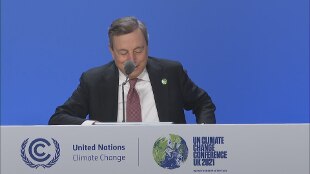Cop26, the alarm from Biden, Johnson and Guterres: "We are on the verge of an abyss, an existential threat"
Cop26, Draghi: "Climate change can divide us"
Share
01 November 2021 "The initiative is very, very important, it traces the path that we will all have to take together to give an answer to the problem that, we keep saying, we cannot solve alone. A single country cannot answer these problems. And this is perhaps the most important initiative aimed at this end ".
This was stated by the Prime Minister, Mario Draghi, at a press conference in Glasgow on the occasion of Cop26.
For Draghi "there is a growing awareness of
environmental disasters
to which neglect this aspect leads, not to fight against climate change, but at the same time there is a participation by some countries, which are perhaps the ones that produce more emissions, not consistent with the commitments that have been taken collectively and that the data also reveal inconsistent with the objectives ".
" The
extraordinary increase in emissions
caused by the reopening of economic activity after Covid
is even more worrying
. We are already beyond the precovid levels.
"" What makes this
negotiation
very complicated
and in general all negotiations of this type, is that countries have different starting conditions from each other. There are rich countries but emit much more than other countries and that, for example, have not followed, as did most of the EU countries, a reduction in emissions as effective path. "
" The EU believe accounts for the '' 8% of the total
world emissions
and China for 28-29%, the USA for 17-18% and the starting conditions are different for this, but they are also different because practically the countries are at a different stage of their economic history of their development.
There are countries that have only recently begun to grow and become more prosperous and therefore the point of view of these countries is to say "after all we have this problem because all of you rich countries have polluted when we did not emit emissions. So now. why must all the burden of
reducing emissions
be passed on to us? "
Then there are countries that are perhaps the most affected by climate change, they are countries that emit very little either because they are poor or because of their incapacity. There are also those that have an economy based essentially, like the small islands of the Caribbean, on tourism.
"There was a beautiful speech this morning by the Prime Minister of Barbados. The speech he made is extraordinary. Often they are vulnerable countries that lack the necessary resources even to make infrastructure investments which is the simplest thing to protect them from the dramatic events of the climate change ".
"So this is the
difficulty of the negotiation
. I expect from this coop 26 that in a certain sense it will build on the results of the G20 and go further".
"If you manage to bring in private capital in the fight against climate change, you realize that there are no financial constraints. The resources of the private sector and of the large international financial institutions, banks, amount to tens of trillions of dollars. What is needed. To mobilize these investments? The public sector must also help this private money to spread the risk. These investments have varying degrees of risk and cannot be borne by the private sector alone and therefore the public sector must intervene.
Global minimum tax it turned out to be extraordinary
"I don't know if there is and what is" the quantitative fall-out of the minimum global tax in Italy born at the G20 in Rome, "while if Minister Franco were here he would certainly know". But there is no doubt that the global tax born at the G20 is the last step in a year of work in which extraordinary results have been fully achieved that have been pursued for years ". And" there have also been results on the link between finance and health, with a new task force within the World Health Organization. "
I am a leader? No, thanks
" Am I a candidate for leader of something? No no, for heaven's sake ... ". Prime Minister Mario Draghi cut short on his personal aspirations for international leadership following the success of the image reported by the G20 in Rome chaired by him.
China and Russia, steps forward
"In the discussions of the G20 there have been shifts in the positions previously taken by these countries in the direction of greater proximity to the issue of combating climate change. By now in terms of objectives, ambitions there are not many differences between these countries and others. It is on the speed with which to face these challenges that there are still differences ".
"The fact that for the first time it was accepted by all that the necessary temperature degrees are one and a half degrees and not two, the ones to be avoided, is very important. This commits these countries, like all the others, to take consistent actions in front of his own public opinion. I do not know how the negotiations with these countries will evolve here ", he added, explaining that however" the impression "is that there is" willingness to talk "and" make progress ".

